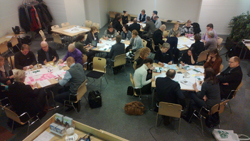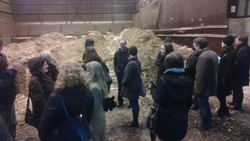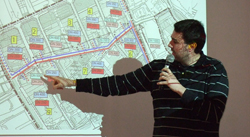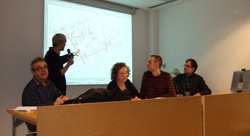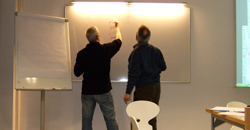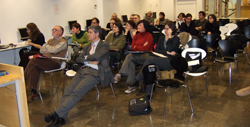

UP-RES
Long training programs in partner countries
During academic year 2011-2012 UP-RES partners (except BRE) delivered long training programs for urban and regional planners. These programs together with the British short courses was the main outcome of the UP-RES project. The extent of these national courses varied from 10-15 ECTS credits to 60 ECTS. During the trainings, several teaching learning methods were be used, such as expert lectures, site visits and other excursions, case studies, individual project work. During the short courses it became evident that urban and regional planners need training that fits well to their work and is practical enough, but at the same time giving sufficient information on renewable energies, energy supply in urban areas and combining these to current planning practices. These long training programs were designed to meet these needs as fully as possible.
To learn more about the short and long trainings, have a look on the reports at materials page.
Finnish training program The Finnish training program was delivered October 2011- June 2012 with 25 participants, most of them being urban and regional planners in municipalities, regional agencies or private consultation companies. The Finnish program was organized in two full day sessions every month (8 modules x 2 days=16 days + individual studies). The training method consisted of lectures, project based learning, case studies, different type of learning assignments, excursions. The eight modules were the following (see also the Finnish draft for each session in annex):
|
|
German training program
The beginning of the German long programs started in early summer 2012 and will finish only in June 2013.
Below are the modules for German programs, for further information please contact Sarah Vautz (sarah.vautz [at] agfw.de)
- Module 1 (2 days á 8h): Fundamentals and introduction into the city as a system - technical infrastructure
- Module 2 (2 days á 8h): Basic conditions and characteristics - energy and energy efficiency
- Module 3 (2 days á 8h): Physical / technical background / forms of energy / energy sources / building
- Module 4 + test 1 (2 days á 8h): Definitions and capabilities / limits of RES
- Module 5 (á 2 days 8 hours): Basic economic data - to module 3 and 4
- Module 6 (2 days á 8h): Creating a concept
- Module 7 + test 2 + excursion (1 day á 8h + 1 day excursion and test 2):
- Module 8 + Certification (1 day 8 hours + 1 day á certification):
Download the German brochure on trainining »
Hungarian program
The Hungarian training program is the most extensive, 60 ECTS in total. The program was run during semester 2011-2012 and hosted by University of Debrecen. The 16 participants were mainly be architects, mechanical, civil and building engineers, environmental engineers, already working or intending to work for local authorities.
The main contents of the pilot training are as follows:
- Module 1: Energy demand management
- Module 2: Fundamentals of urban design
- Module 3: City management
- Module 4: Urban climatology
- Module 5: Energy conscious building retrofit
- Module 6: Environmental protection
- Module 7: Power supply
- Module 8: District heating and cooling
- Module 9: Geothermal energy
- Module 10: Solar energy
- Diploma project
For further information please contact prof. Andras Zold (profzold [at] yahoo.fr).
Spanish program The Catalan Chamber of Architects’ School hosts the Spanish training program that started in October 2011 and finished in summer 2012. The long term course is designed and structured in ten modules with an extension between 12 and 18 hours each. The training is delivered as evening classes twice a week.
Poster of the Spanish program » (pdf) For further information please contact Christoph Peters, CPeters [at] saas.cat |
 |
The sole responsibility for the content of this presentation lies with the authors. It does not necessarily reflect the opinion of the European Union. The European Commission is not responsible for any use that may be made of the information contained therein. |
![]()
Viimeksi päivitetty:
15.05.2013
. Sivusta vastaa: webmaster-aaltopro [a] aalto.fi
Aalto PROn päätoimipaikka: Dipoli-talo | PL 18 000, 00076 AALTO (Otakaari 24, 02150 Espoo).
